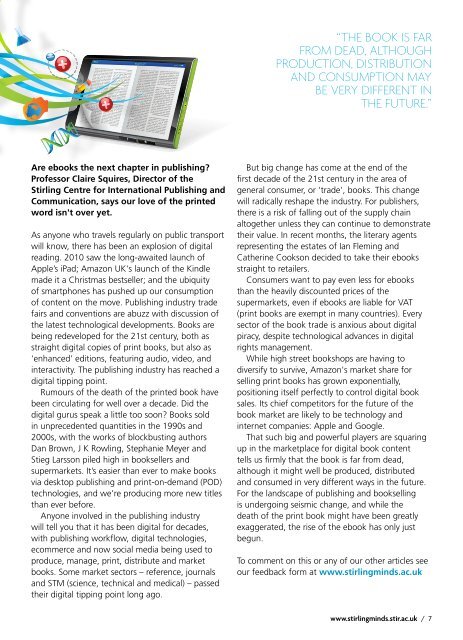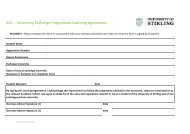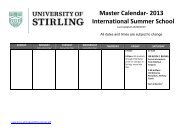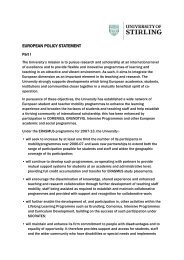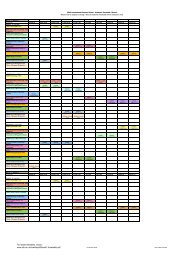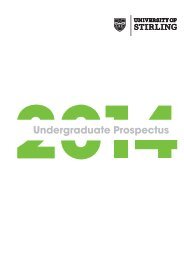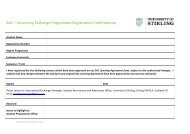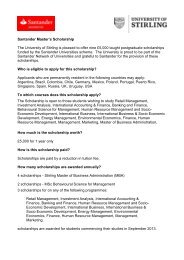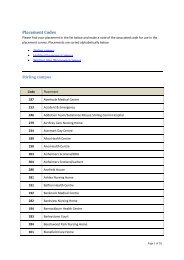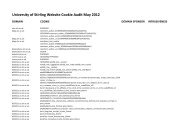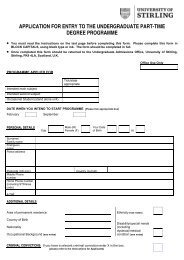Stirling Minds 2011 - University of Stirling
Stirling Minds 2011 - University of Stirling
Stirling Minds 2011 - University of Stirling
Create successful ePaper yourself
Turn your PDF publications into a flip-book with our unique Google optimized e-Paper software.
“THE BOOK IS FAR<br />
FROM DEAD, ALTHOUGH<br />
PRODUCTION, DISTRIBUTION<br />
AND CONSUMPTION MAY<br />
BE VERY DIFFERENT IN<br />
THE FUTURE.”<br />
Are ebooks the next chapter in publishing?<br />
Pr<strong>of</strong>essor Claire Squires, Director <strong>of</strong> the<br />
<strong>Stirling</strong> Centre for International Publishing and<br />
Communication, says our love <strong>of</strong> the printed<br />
word isn't over yet.<br />
As anyone who travels regularly on public transport<br />
will know, there has been an explosion <strong>of</strong> digital<br />
reading. 2010 saw the long-awaited launch <strong>of</strong><br />
Apple’s iPad; Amazon UK's launch <strong>of</strong> the Kindle<br />
made it a Christmas bestseller; and the ubiquity<br />
<strong>of</strong> smartphones has pushed up our consumption<br />
<strong>of</strong> content on the move. Publishing industry trade<br />
fairs and conventions are abuzz with discussion <strong>of</strong><br />
the latest technological developments. Books are<br />
being redeveloped for the 21st century, both as<br />
straight digital copies <strong>of</strong> print books, but also as<br />
‘enhanced’ editions, featuring audio, video, and<br />
interactivity. The publishing industry has reached a<br />
digital tipping point.<br />
Rumours <strong>of</strong> the death <strong>of</strong> the printed book have<br />
been circulating for well over a decade. Did the<br />
digital gurus speak a little too soon? Books sold<br />
in unprecedented quantities in the 1990s and<br />
2000s, with the works <strong>of</strong> blockbusting authors<br />
Dan Brown, J K Rowling, Stephanie Meyer and<br />
Stieg Larsson piled high in booksellers and<br />
supermarkets. It’s easier than ever to make books<br />
via desktop publishing and print-on-demand (POD)<br />
technologies, and we’re producing more new titles<br />
than ever before.<br />
Anyone involved in the publishing industry<br />
will tell you that it has been digital for decades,<br />
with publishing workflow, digital technologies,<br />
ecommerce and now social media being used to<br />
produce, manage, print, distribute and market<br />
books. Some market sectors – reference, journals<br />
and STM (science, technical and medical) – passed<br />
their digital tipping point long ago.<br />
But big change has come at the end <strong>of</strong> the<br />
first decade <strong>of</strong> the 21st century in the area <strong>of</strong><br />
general consumer, or ‘trade’, books. This change<br />
will radically reshape the industry. For publishers,<br />
there is a risk <strong>of</strong> falling out <strong>of</strong> the supply chain<br />
altogether unless they can continue to demonstrate<br />
their value. In recent months, the literary agents<br />
representing the estates <strong>of</strong> Ian Fleming and<br />
Catherine Cookson decided to take their ebooks<br />
straight to retailers.<br />
Consumers want to pay even less for ebooks<br />
than the heavily discounted prices <strong>of</strong> the<br />
supermarkets, even if ebooks are liable for VAT<br />
(print books are exempt in many countries). Every<br />
sector <strong>of</strong> the book trade is anxious about digital<br />
piracy, despite technological advances in digital<br />
rights management.<br />
While high street bookshops are having to<br />
diversify to survive, Amazon's market share for<br />
selling print books has grown exponentially,<br />
positioning itself perfectly to control digital book<br />
sales. Its chief competitors for the future <strong>of</strong> the<br />
book market are likely to be technology and<br />
internet companies: Apple and Google.<br />
That such big and powerful players are squaring<br />
up in the marketplace for digital book content<br />
tells us firmly that the book is far from dead,<br />
although it might well be produced, distributed<br />
and consumed in very different ways in the future.<br />
For the landscape <strong>of</strong> publishing and bookselling<br />
is undergoing seismic change, and while the<br />
death <strong>of</strong> the print book might have been greatly<br />
exaggerated, the rise <strong>of</strong> the ebook has only just<br />
begun.<br />
To comment on this or any <strong>of</strong> our other articles see<br />
our feedback form at www.stirlingminds.ac.uk<br />
www.stirlingminds.stir.ac.uk / 7


